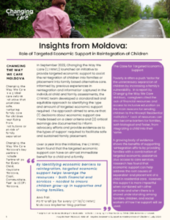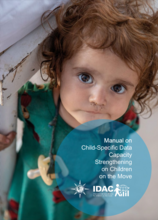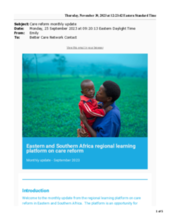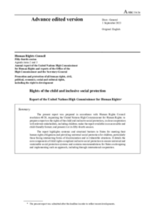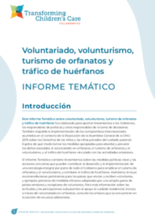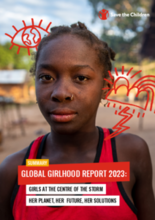Demographic Data
|
Sources: World Bank, UNICEF, UNDP HDR 2015, DHS 2013 |
Displaying 811 - 820 of 14551
The government of Kenya has been working with UNICEF, Changing the Way We Care, Charitable Children's Institutions and local CSOs to pilot care reform at the county level. Learning from these demonstration counties is being used to shape care reform in other counties and at the national level. This video explores care reform in one demonstration county, Kisumu.
In septembrie 2022, Changing the Way We Care (CTWWC) a lansat o inițiativă pentru a oferi sprijin economic direct în procesul de reintegrare a copiilor în familii sau plasament în servicii de îngrijire de tip familial. În baza experiențelor anterioare de reintegrare, dar și din informațiile extrase din evaluările individuale ale copiilor și familiilor, echipa CTWWC a dezvoltat o abordare standardizată și echitabilă pentru a identifica tipul și valoarea sprijinului economic direct necesar.
In September 2022, Changing the Way We Care (CTWWC) launched an initiative to provide targeted economic support to assist the reintegration of children into families or placement into family based alternative care. Informed by previous experiences in reintegration and information captured in the individual child and family assessments, the CTWWC team developed a standardized and equitable approach to identifying the type and amount of targeted economic support required.
This manual aims to help countries and their national statistical systems to improve the collection, analysis, sharing and use of data on children on the move.
This is the monthly update of the Eastern and Southern Africa Regional Learning Platform published in September 2023.
The present report was prepared in accordance with Human Rights Council resolution 49/20, requesting the United Nations High Commissioner for Human Rights: to prepare a report on the rights of the child and inclusive social protection, in close co
Este Informe Temático sobre voluntariado, volunturismo, turismo de orfanatos y tráfico de huérfanos fue elaborado para aportar lineamientos a los Gobiernos, los responsables de políticas y otros responsables de la toma de decisiones. También respalda la implementación de los compromisos internacionales asumidos en el contexto de la Resolución de la Asamblea General de la ONU 2019 sobre los Derechos de los niños y las niñas privados del cuidado parental. Explica de qué modo tomar las medidas apropiadas para abordar y prevenir los daños asociados al voluntariado en orfanatos, el turismo de orfanatos y el volunturismo, y al tráfico de huérfanos vinculado con las actividades anteriores.
The climate crisis is already changing girls’ lives and futures. Save the Children’s analysis shows that between now and 2030, almost 60% of girls - that’s 931 million - will experience at least one extreme weather event, like flooding, drought or heatwaves.
The climate crisis is already changing girls’ lives and futures. Girls across Africa are facing growing challenges as the climate crisis increasingly impacts the continent, leading to a range of extreme weather patterns. In southern parts of Africa, girls are enduring devastating cyclones and floods. Meanwhile, the Sahel, Eastern, and Horn of Africa regions - home to the highest rates of child marriage - are grappling with severe droughts. Climate-induced migration is also on the rise in Western, Southern, and Central Africa.

